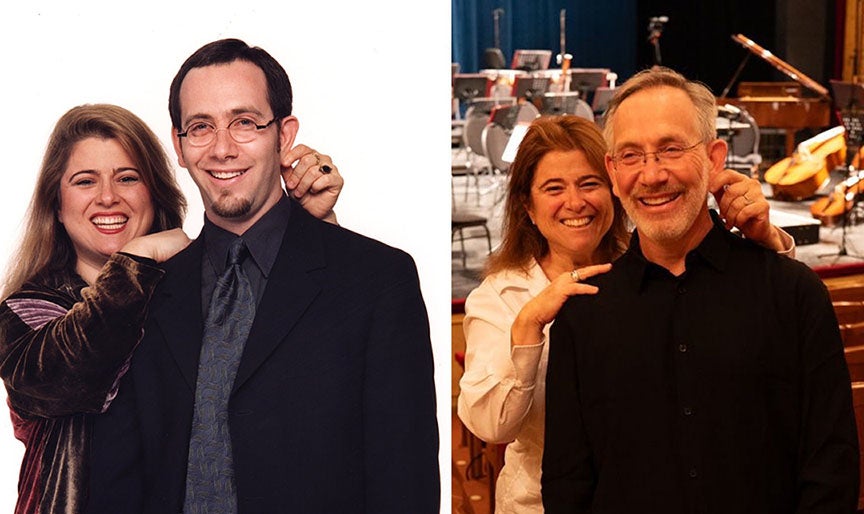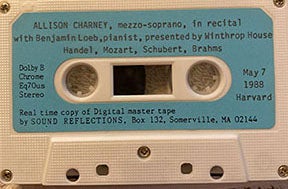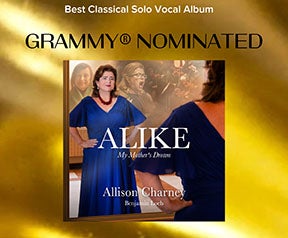
Behind the Music
The friendship that’s fueled a lifetime of collaborations—and a new Grammy nomination!
Allison Charney Epstein ’89, P’28
Special Concentration: Music and European Cultural Studies
Winthrop House
Benjamin Loeb ’89
Concentration: Music
Adams House
Allison Charney Epstein and Ben Loeb were already good friends by the time they directed and conducted The Marriage of Figaro together for the Lowell House Opera in 1989. They've been making music together ever since their professor, Luise Vosgerchian, introduced them. Their latest work, ALIKE: My Mother’s Dream, just earned them both a Grammy nomination for Best Classical Solo Vocal Album.
Today, Allison lives in New York City with her husband, Adam Epstein ’88, and their children, while Ben is with his family in Plano, Texas. Nonetheless, they still seek each other out as creative sounding boards and professional partners. Catch up with this duo to learn how Harvard brought them together and what their partnership means to them now.
Did you always know you wanted careers in music?
Ben: Definitely! I remember talking in the dorms about our ambitions, from singing at major opera houses to being music directors of international orchestras. For the few other serious classical musicians we knew, there were similar goals. Remarkably, many of those same friends from then have achieved great things in music. Allison and I were pretty excited that when our new album charted on Billboard this summer that there were three Harvard alums (all students of Professor Vosgerchian) in the Classical Top 12: the two of us and Yo-Yo Ma ’76!
Allison: I was determined to be a musician, too. I traveled to New York once a week for voice lessons while at Harvard and knew that I would go to a music conservatory after Harvard—which I did. I got two graduate degrees in music from the Peabody Conservatory at Johns Hopkins University, the second of which I got while also starting my career, singing opera all over the country.
How long have you known each other?
 Ben: Since 1987.
Ben: Since 1987.
Allison: I remember Professor Vosgerchian insisted that I ask Ben to play piano for me. At first, I balked: Ben seemed scary. He clearly knew so much more than I did about music, and I was sure he wouldn’t take me seriously. Much to my surprise, he eagerly accepted my request that we start making music together and the rest is history. (Ben likes to say that I may have been scared of him that first time we spoke, but that he’s been scared of me ever since!)
Ben and I led the Lowell House Opera in our senior year. He conducted, and I directed and sang a leading role in The Marriage of Figaro (which was actually my senior thesis). I also sang in The Merry Wives of Windsor the year prior, which was the very first opera conducted by Alan Gilbert ’89—our classmate who later became music director of the New York Philharmonic [and is now chief conductor for the NDR Elbphilharmonie Orchestra in Germany]. By the way, Ben actually played viola in that orchestra.
What are your most lasting memories of Harvard?
Allison: Definitely the friendships, so many of which have lasted for decades, and of course, my relationship with Luise. Other academics were important too, but, in the end, it’s the relationships I value most.
Ben: My experience was similar in terms of lasting friendships, but I don’t discount Harvard’s academic rigor and high intellectual standards, which made a strong impression on me and equipped me well for conservatory and beyond.
Do you stay connected to Harvard today?
Allison: Absolutely yes. I always want to tell undergraduates that they may think their four years on campus are the point of their Harvard education. But, truly, those four years are just the entry point to the alumni community, which is the most lasting relationship any of us has with Harvard. I also devote a tremendous amount of my volunteer efforts to Harvard-related activities.
 Tell us about your new Grammy-nominated album, Alike: My Mother's Dream.
Tell us about your new Grammy-nominated album, Alike: My Mother's Dream.
Allison: The album is a tribute to my mother’s lifelong mission to focus on what makes us alike as human beings rather than what separates us. How could there ever be a more important goal than that? The album is made up of seven tracks of classical music: four pieces by living composers and three rediscovered and reimagined pieces that had been composed at the end of the Romantic era of classical music by composers of the past.
The heart of the album is the country pairs: one composed by a Russian, one by a Ukrainian; one by an Iranian, one by an Israeli. Our point is to show that just as these pieces belong right next to each other on our album, so do these people belong next to each other—living in peace—on planet Earth.
Ben: There are also the three orchestral anchor pieces that help us tell the story of the album. It opens with Dvořák’s nostalgic “Songs My Mother Taught Me” and closes with American composer Kim D. Sherman’s magnificent “Invocation”—a setting to music of a single line of text: “Make peace on all your lands” sung in 15 different languages. In the middle is the first-ever English-language recording of Amy Beach’s 10-minute-long scena for soprano and full orchestra, “Jephthah’s Daughter.”
Allison: Her handwritten manuscript was lost to the world for over a century, having been seized by the German army in World War I, and only just recently discovered for the first time. It serves as yet another example of all that is lost in war—when people are divided—there is not just a horrible loss of life, but also of great beauty and great potential. I want to acknowledge that this album is obviously just a tiny effort to make this very large point. It’s really a drop in the bucket. But it’s my hope that it might inspire other drops from other people. And, in the end, if we all put in just our drop, maybe the bucket would overflow with goodness—and wouldn’t that be something?
How do you collaborate when you’re geographically apart?
Ben: We choose repertoire through lots of discussion, plan performances before recording, and schedule rehearsals around those. For this album, we performed in Dallas before we recorded there, and then I had Allison come perform as a guest soloist at a festival I conduct in the Czech Republic, after which we recorded in Prague.
Allison: We also consult each other on other musical projects where we are not collaborating. We really rely on one another as creative sounding boards.
Do you come back to campus often?
Ben: I go mainly for Reunions, which are very meaningful.
Allison: Quite a bit—and now as a parent, it’s fun seeing the campus through my son’s eyes.
How do you feel about being nominated for a Grammy award?
Ben: It’s an incredible honor to have been considered worthy for such recognition by our peers in the music industry.
Allison: And it’s especially meaningful that we’ve both been nominated for the first time—together. And even more so, since we dedicated this album to the memory of Luise Vosgerchian. I think she’d get a kick out of the extra notice, and I hope she’d be rewarded to know we’re still at it.